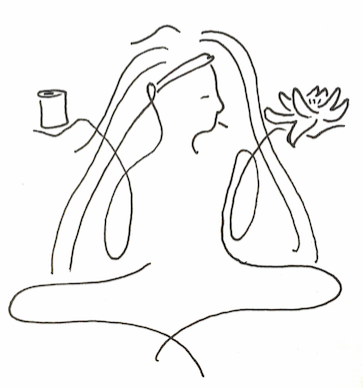The Late Night Buddhist
By Scott Taylor
Reader Columnist
I opened Pandora.com to my “Three Dog Night” station the other day, feeling nostalgic toward those late-’60s and early-’70s songs about love, debauchery, altered states and, oh yeah, changing the world.
The first song to pop up was “Black and White,” which got me to thinking about racism and how we view others in the world. 
For those of you under the age of 50 who likely never heard it, the song was a celebration of racial harmony from a band of long-haired freaks (surprise!) most famous for the declaration that their good friend Jeremiah was a wine-drinking amphibian.
While many of us like to claim, “I don’t have a racist bone in my body,” or, “I don’t see color, I only see another person” — despite the fact that that person may obviously be lighter, darker, hairier, etc., than us — I know Malcolm Gladwell would disagree with you.
He’s one of my favorite nonfiction writers and is of mixed ethnicity — but aren’t we all? His books explore the unexpected discoveries that arise from scientific studies of human psychology, behavior and sociology. And if there’s one thing a Late Night Buddhist relishes, it’s scientific evidence that turns our conventional ways of thinking on their collective head.
In his book, Blink: The Power of Thinking Without Thinking, he cites university studies that show we all have racial stereotypes ingrained into our psyche, no matter our race, ethnicity, age, gender, etc. There’s no need for me to describe the experiments here — you can look them up yourself — but time after time, when faced with a split-second decision about interacting with various people in various settings, test subjects of a range of ethnicities made judgments based on people’s physical appearances, including skin color.
While this may seem disturbing, suggesting that perhaps racism is an inherent quality that can’t be eliminated, I think rather it’s a good thing that we recognize that it exists and that it has been culturally and socially indoctrinated in us.
The first step in eliminating an unwanted quality in ourselves is recognizing and admitting it exists. Then we can take steps to make a change.
What would a “good” Buddhist — and let me know if you find one — say about racism? It wouldn’t even be an issue. Buddhists see every living thing as simply a part of the whole, with everything being connected by the same life force in which we all share. There’s no distinction between “different types” of life. So maybe we could all just be happy together.
After all, aren’t we all the same race: the human race?









 Coming up this week! Don’t miss Live Music, the Summer Sampler, the Art Party, Monarch Grind, the Sandpoint Renaissance Faire, and more! See the full list of events in the
Coming up this week! Don’t miss Live Music, the Summer Sampler, the Art Party, Monarch Grind, the Sandpoint Renaissance Faire, and more! See the full list of events in the 